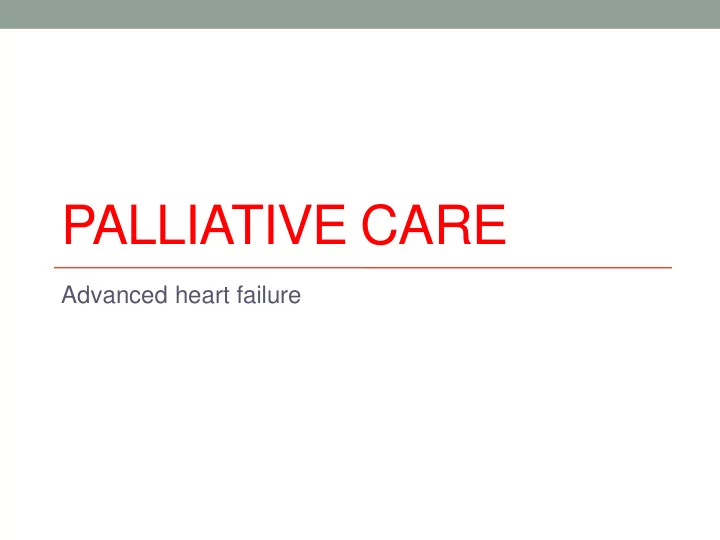

PALLIATIVE CARE Advanced heart failure
Heart failure has a poor prognosis • Heart failure mortality remains unacceptably high. • 30-40% of patients die within the first year of diagnosis(Cowie et al, 2000; Hobbs et al, 2007). • 1 year survival rates are worse than those for breast, prostate and bladder cancer but better than those for lung and stomach cancer, and very similar to that for cancer of the colon (Stewart et al, 2000).
• National Heart Failure Audit report from 2009/2010 – represents data relating to registered organisations • Mortality rate falls from 32% to 23 % for patients who are followed up by a Cardiologist or have access to specialist heart failure services. • Inpatient mortality 6.4% for cardiology ward patients and 12.4% for general ward patients
• Prognosis for valve disease and heart failure with preserved ejection fraction is the same as that for patients with ejection fraction < 40% - LVSD. • Deprivation associated with increased morbidity – patients admit to hospital 5 years earlier than those living in more affluent areas.
“You’re Better Off with Cancer”
Inequalities • Barriers to receiving information and choices in care including Preferred Place of Care and Advanced Care Planning (Levenson et al, 2000; Boyd et al, 2004; NHS Improvement, 2010). • Patients are living and dying with significant symptom burden that is sometimes greater than patients dying from cancer (Anderson et al, 2001). • Poor quality of life directly linked to symptom burden (Bennett et al, 1998).
• Heart failure patients more likely to die in hospital and receive invasive investigations and treatment interventions that may go against their wishes (Lynn et al, 1997). • Very few applications for financial support – DS1500 (Onac et al, 2010). • Absence of emotional support in the older heart failure patient (Froggatt, 2001). • Increased incidence of clinically significant depression – associated with increases in mortality (Rutledge, 2006).
Barriers to supportive and palliative care • Prognostic uncertainty. • Difficulties in defining end-stage heart failure. • High prevalence of sudden cardiac death. • Physicians reluctance to discuss prognosis. • Physicians lack of experience in “ breaking bad news”. • Lack of resources • Communication breakdown
Heart failure disease trajectory Goodlin (2009)
Prognostication • Advancing age • Refractory symptoms despite optimal therapy • 3 episodes of decompensation in less than 6 months • Dependent with more than 3 ADL’s • Cachexia (>5% non-fluid related weight loss) • Progressive renal dysfunction • Resistant hyponatraemia • Serum albumin < 25g/l • Depression • Multiple shocks “storms” from device Jaarsma et al (2009)
Use your clinical acumen and experience ESCAPE trial – large multicentre study indicated that nurses predictions of death were more accurate than a prognostic model based on BP, renal function, and exercise tolerance. Yamokoski et al(2007)
Patients with advanced heart failure often suffer with refractory symptoms including: • Breathlessness • Depression • Persistent cough • Anxiety • Pain • Insomnia • Fatigue • Cachexia • Limitations in physical • Nausea activities • Constipation
Symptom Control “Physical and psychosocial distress are directly related with heart failure pathophysiology therefore therapies that address the pathophysiology of heart failure and improve cardiac function similtaneously palliate heart failure related symptoms” Goodlin (2009)
Symptom Control • Oedema -Diuretics – synergistic blockade – IV- Abx- Cream • Dyspnoea -Diuretics – O2-Nitrates-NaCl nebs-low dose morphine- Lorazepam • CoughDiuretics- ACE intolerant- Abx- NaCl nebs- Codeine- low dose morphine • PainAngina/hepatic – nitrates – colchine/allopurinol – gout – MS – avoid NSAID – gel better option- paracetamol • Nausea & VomitingAvoid cyclizine & Domperidone -CKD 4 Haloperidol- reduced peristalsis - Metoclopramide • Cachexia/anorexiaRefer to dietician – MUST score – encourage small frequent meals of choice • ConstipationRoutine aperients- Bulk forming (Fibogel, Softener – Docusate, Stimulant Bisacodyl or Senna/ Osmotic – Macrogol or Lactulose
Symptom Control • Depression - Refer “Talking Therapies” – Specialist Palliative Care - Avoid tricyclic – Choose SSRI- Citalopram, Sertraline, Mirtazepine if nausea and poor appetite • Anxiety -Refer as above – Consider Anxiolytic – Lorazepam, Diazepam, Fluoxetine, Citalopram • Insomnia - Review of symptoms – sleep hygiene- Consider -Temazepam- Lorazepam- Zopiclone • Fatigue and LethargyCheck Hb , U&E’s, TFT – refer for aids and adaptations – OT- physio
Breaking down the barriers- current initiatives: • British Heart Foundation commissioned National Council for Palliative Care to research barriers to communication and “difficult” conversations from a patient/carer perspective. • Dying Matters – Lets talk about it – coalition of NCPC aims to change public attitudes and behaviours around dying, death and bereavement. • www.dyingmatters.org • Death cafe
BHF ICD deactivation at the end of life: Principles and practice A discussion document for healthcare professionals
Recommend
More recommend